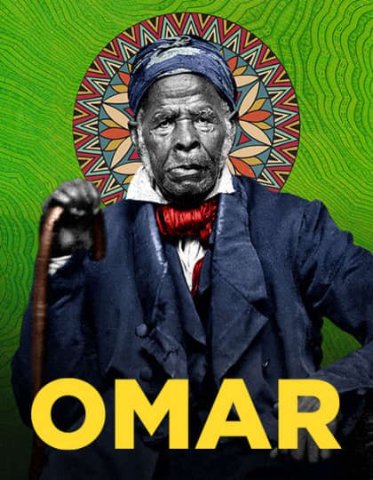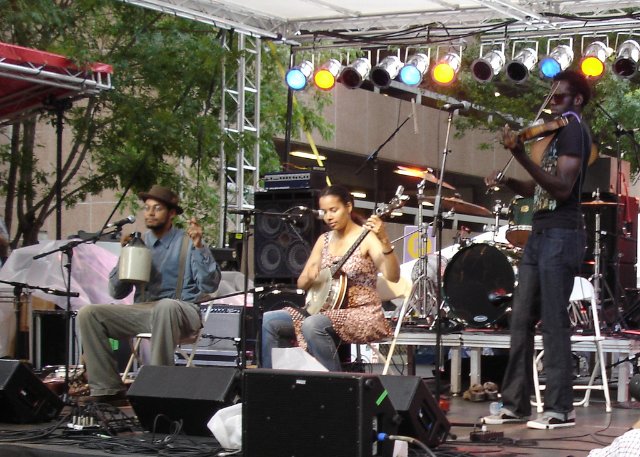Rhiannon Giddens Curates Ojai. Part I
Spiritual and Historic Journey
By: Susan Hall - Jun 13, 2023
Rhiannon Giddens curated the Ojai Music Festival this year. She often sings “I shall not be moved.” And yet, in the strong force you feel in her wake, you know and feel she is moving and you are moved. Giddens is fond of the double and triple entendre. For four days we are sailing with her and we are also in her wake.
The list of awards she’s won is familiar. If you're unaware, just scroll through the list in your mind and you can check most of them. She does not like the word genius which the MacArthur uses.
Yet Giddens does not feel modest. Instead, you get a refreshing sense of direct contact. She is respectful and adventuresome, mixing feeling and knowledge into a song, a pluck of the banjo or even an opera.
Ojai gives artists much latitude, and Giddens presses the boundaries of performance.
Her deep concern, as a mixed-race American, is to flesh out our American story. For so long we have suppressed the knowledge of slavery's impact on human beings. As Giddens says, slaves were not put on boats to ride out in the Middle Passage. People were. They ended up slaves in America when they were auctioned off on our shores.
In Georgia today, on a new plantation, the auctioning off of a woman and her baby is re-created. The auctioneer says the purchaser has an option: buy the woman with her baby or without. Watching the ritual, we cannot help but feel the woman's pain at the notion that her newborn will soon be taken from her.
This year, Giddens and her collaborator Michael Abels, another mixed-blood American and familiar to filmgoers as the creator of scores for Jordan Peele, including the remarkable “Get Out,” tackled the story of Omar bin Said, a Muslim from Senegal who was captured and shipped to America at age 37, and survived here by adhering to his faith, despite the requirement of writing the 23rd Psalm over and over: ‘The Lord is my shepherd. I shall not want,” cannot suppress Allah.
The Spoleto Festival had come to Giddens with the small autobiography Omar bin Said had written. He died in North Carolina in 1864. Giddens, a North Carolina native, was appalled that she did not know his story. She is a person inclined to say “yes” when someone comes to her with an idea, and she said “yes" again to Spoleto. She was going to make sure Omar’s story was widely known.
Covid was a horror, she acknowledges, but one which gave her an extended opportunity to work with Abels on What’s App. The shutdown gave Omar the opera quiet gestation time.
If we are to flesh out our story, it is experiencing Omar’s. It may help us if not not understand at least appreciate what Black slaves have suffered in this country. And also ho they survived.
When Abels and Giddens talk about the tree images and rootedness in the opera, it is hard not to see a rope hanging from a tree branch and the triangular peaks of those white caps gathered in the dark of night to take their version of justice into their own hands.
What is fascinating about artists today like Giddens, Julia Bullock, Davone Tines and Curtis Stewart among others is that they are classically trained, highly educated and also technically superior. They bring this mix to performing arenas. They are not going to be told by a big business music organization what to do.
That someone like Clive Gillenson at Carnegie can bring these artists into the iconic Hall is a tribute to him. Davone Tines got up on the stage for his debut there and told this story: He was sitting on a hill in Vermont chatting with a fellow artist who asked him why he didn't sing in Carnegie Hall. Tines replied: Why would I want to sing there? Gillenson provided the answer. The Met Opera brass, reading Tines on social media where he claimed they were racist, refused to hire him. Different strokes for different folks.
Giddens is an Oberlin graduate. There she sang Manon, among other traditional roles in the opera canon. She returned home after college and made a mark in the Carolina Chocolate Drops, bringing to sound-light the folk songs of Blacks in the region which had been unearthed. She performed with ChocolateDrop Justin Robinon on fiddle at Ojai.
Some say Giddens is a scholar. She is deeply thoughtful but claims that others point her onto virginal paths. (This is an adjective you wouldn't deploy after you hear her take on Alberta Hunter’s “The Handyman”).
Giddens is extremely generous in her praise of her collaborators. She always picks people who are more talented than she is, she claims.
The young cellist Karen Ouzounian is a case in point. She performed often at this year’s Ojai. Most striking was the role she was given in the ensemble performing a staged chamber version of the Omar opera, Omar's Journey, commissioned by Ojai. She is not a show off, but you could not help hearing her musical lines and the vigor and passion of her delivery as the opera progressed.
Lunching with Ouzounain’s husband the composer Lembit Beecher in 2017, we got around to the subject of an artist’s development. I noted that after the technical demands had been mastered, the next phase was listening. He said at the time that this was a realization Karen had just come to. We hear its rich results in Ojai.
Mazz Swift was another standout among standouts in Ojai. She is a Silk Road artist. She says: Since I was a little kid, the sound of the violin has always been attractive to me. I think something about the soaring melodies of the Romantic period was what first caught my attention. As soon as I found out what a violin was, and that a violinist played the violin, I went around telling everyone I met that I was a violinist — forcing my parents to eventually get me a violin and some lessons! It was meant to be for sure!”
Her riveting rendition of Carlos Simon’s Between Worlds concluded the work. Between Worlds is a selection of four four-minute works for violin, viola, cello and double bass. Although each work is written to be performed sorrowfully at the start, Swift rapidly took us into a frenzy that could only be called joyful.
Ojai is always an ear-opener.



